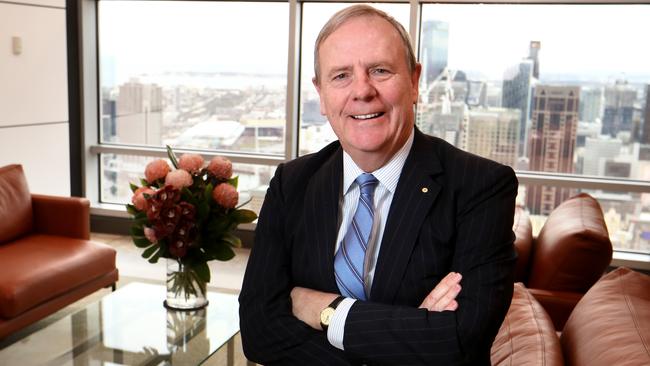Deregulate to boost economy, says Peter Costello
Australia has less policy ammunition than ever before, warns former treasurer.

Fiscal and monetary policy have run out of puff, with “supply-side” reforms such as deregulation now the key to improving efficiency and restoring growth momentum, according to former treasurer Peter Costello.
A day after the International Monetary Fund again slashed its growth forecast for Australia from 2.1 per cent to 1.7 per cent, Mr Costello said he was not part of the school of thought that said it was “all doom and gloom out there”.
“But personally, I’d say that we need to turn to another arm of policy which has been long forgotten and that’s the supply side,” he told a Citi investor conference in Sydney.
READ MORE: RBA cuts won’t help the economy
“Monetary and fiscal policy has run its course, so we have to do something on the supply side to take away some of the hand-brakes and help boost supply.
“After 10 years of deficits and 28 years of continuous growth, we could really get a boost by dealing with some of the imbalances that have built up in the economy.”
Pressure building
While the Morrison government has been under pressure to ditch its commitment to a budget surplus and pump-prime the economy by going into deficit, Mr Costello said he didn’t believe this held much appeal.
The government, he said, had worked hard to rein in the deficit, and was reluctant to “give it all away”.
“If you don’t anchor it to something and you say any deficit is permissible, then as a Treasurer you just shell out money to any cause,” Mr Costello, who is also chairman of the $162bn Future Fund, said.
“If a $10bn deficit is permissible, then why not $20bn, $30bn or $40bn?”
Global injection
The IMF report, released on Tuesday, called on governments around the world with spare fiscal capacity to loosen the purse-strings and revitalise the global economy.
Not only did the agency cut its 2019 growth forecast for Australia to 1.7 per cent, it also lopped 50 basis points off next year’s forecast to a below-average 2.3 per cent.
The Reserve Bank of Australia, in contrast, has forecast 1.7 per cent growth this year, rising to 2.8 per cent in 2020.
Despite three successive RBA cuts to a record-low cash rate of 0.75 per cent, Mr Costello said there had been little impact on confidence levels.
In fact, the outcome was perverse, with people now asking the question: “Why are they so worried?”
This was unlikely to stop the RBA from further lowering the cash rate, for two reasons.
First, the central bank wanted to lift the inflation rate from 1.6 per cent to within its target range of 2-3 per cent.
The second, unspoken consideration was that the rest of the world was also slashing policy rates, and the RBA didn’t want to be an outlier and push up the dollar.
The cash rate was therefore lower than it was in the financial crisis, and “every indication is it will go lower still”.
Risk growing
Mr Costello said house prices remained very high compared to the rest of the world, with Sydney and Melbourne property now recovering after a two-year period when the pressure came off.
High prices created elevated debt household indebtedness.
“We’ve never had the correction they had in the US and Europe in 2008-09,” he said.
“If you don’t moderate it, the risk is it keeps growing and growing and it all blows up.”
Mr Costello said he felt very sorry for retirees in the current environment of ultra-low rates.
While borrowers and sophisticated investors benefited as asset prices were bid up -notably property - retirees were getting little or no return on their savings.
The danger for professional investors was a “stampede to the exits” when interest rates returned to more normal levels.
“The astute investor will be building a little safety into their portfolios in these circumstances,” Mr Costello said.
While he hoped that Australia could avoid any global recession, as it had in the Asian financial crisis, the 2001 tech crash and the 2008 crisis, the ex-treasurer said the truth was the country had less policy ammunition now than in the past.



To join the conversation, please log in. Don't have an account? Register
Join the conversation, you are commenting as Logout